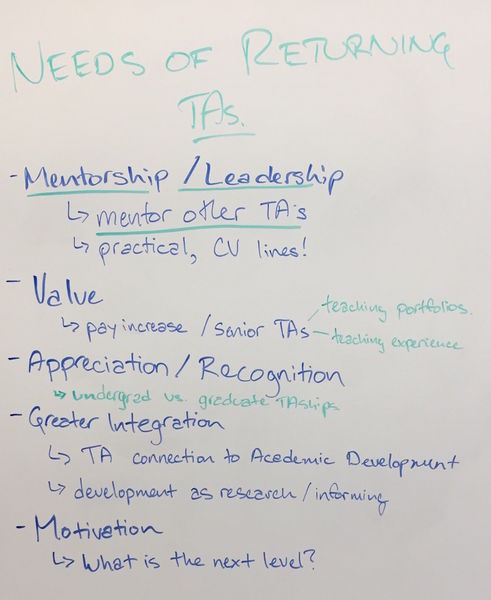Returning TAs
Facilitators: Kyle Gooderham; Shaya Golparian
This page gathers notes and thoughts about this meeting.
Facilitated activities:
Why should we offer training for returning TAs?
-
- Help them break some bad habits
- Help them assess their success
- Deepen their learning
- Professional Development
Challenges with Programming for Returning TAs
-
- redundancies in the TA Training program from year to year
- needing to scale up competency level
- Pro D needs of returning TAs
- Motivation to attend
- Being able to meet the demand (esp, if you don’t have enough resources)
- Institutional support around teaching
- Unit culture that values teaching
Needs of Returning TAs

Sample Programs for Returning TAs
Program 1
Goals of the program:
- Develop mentorship/leadership skills among returning TAs.
-
- → Motivation – commitment to ongoing learning
Components of the program:
- Returning TA Training and orientation re: mentorship (theory and skills)
- Matching b/w mentor/mentee for term
-
-
- consistency/relationship and match teaching environment
- TA Training coordinator matches/facilitates program
-
- Check-in CoP – “How is it going?” (for mentors)
- Check-in b/w mentee-mentor
- Peer review of mentoring
- Ongoing feedback (between mentors; mentor-mentee; mentee-students; and faculty-mentee (if on board)
Logistics:(When? How long? Who will run the program? What’s needed?)
When:
-
- Orientation/training → Aug (Half day/ ~ 4 hrs)
- Mentee-Mentor→ term (Sept – Dec / Jan – May)
- Check-in sessions → mid-term ( ~ 2hrs)
- Feedback → ongoing
What’s needed?:
-
- FOOD
- Faculty- buy-in (i.e: if TAs are paid to attend training)
- Tangible incentive
-
- getting paid for training
- letter of recognition
- CTLT support (re:training)
Program 2
Goals of the program:
- Integrate TAship into broader Prof path
- Teaching and learning/ Scholarship/Research
- Novice → Expert
Components of the program:
- Mentorship Program
- ProD Plan (ie: teaching portfolio)
- Workshops:
-
- Orientation session
- Departmental ISW
- Mentoring
- Teaching Portfolio
- TA dev. Plan
- Team/group management
- Why TA? value of TAship
- Communication upstream –> advocacy
- Facilitation
- Lesson planning/Design
- Mini-lesson practice (departmental)
- Community of practice (run by GTAs)
Logistics:(When? How long? Who will run the program? What’s needed?)
-
- CTLT support
- Department support
- Collaboration with other departments
Program 3
Goals of the program:
- Motivating and showing value of TAship –> situating in larger career goals
-
- ensure program is applicable to their experience/tasks
-
- Navigating competing demands (TAship/research/etc)
Components of the program:
- @TA orientation – what is the value of TAship/ professional development
-
- to new TAs: Why come back later?
- showing a pathway of ProD
- framing TAship position in their career
(how to choose sessions)
-
- Reflective modules – in each session (10 min)
-
- “how will this be used in your future career?research?”
- provide focus on SKILLS→ “How would I describe on my CV?”
-
- TAship in research/career module (for senior TAs) – end of year
(What have you developed (Skills) and what do you want to work on next year?) — (Motivate for new sessions)
-
- How will you talk about your skills?
- What have you learned?
- -How apply to research?
- -How use in career?
- How will this appear on your CV?
- What do you want to develop further in?
- How will you identify future ProD?
- How will you talk about your skills?
Logistics:(When? How long? Who will run the program? What’s needed?)
- Simplified, these are modifications for Exp TAs in existing programs
- Could be run with multi-departments
- TAship in research/career module (for senior TAs)
-
-
- offered for senior TAs and offered at the end of the year
- possible shared (multi-dept)
- collects reflections from each session
- could include new TAs – “Along for the ride’ but mostly targeting senior TAs
-